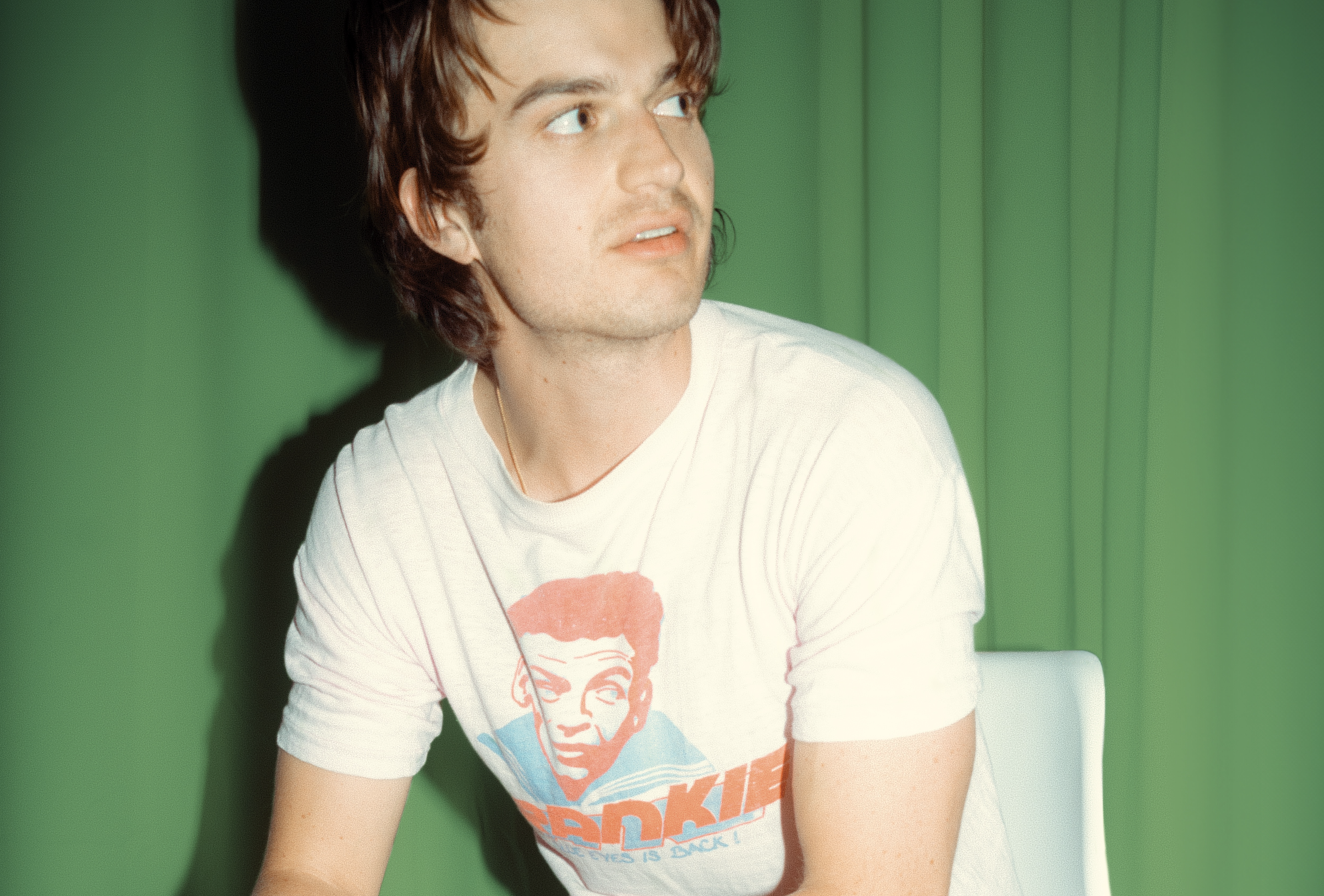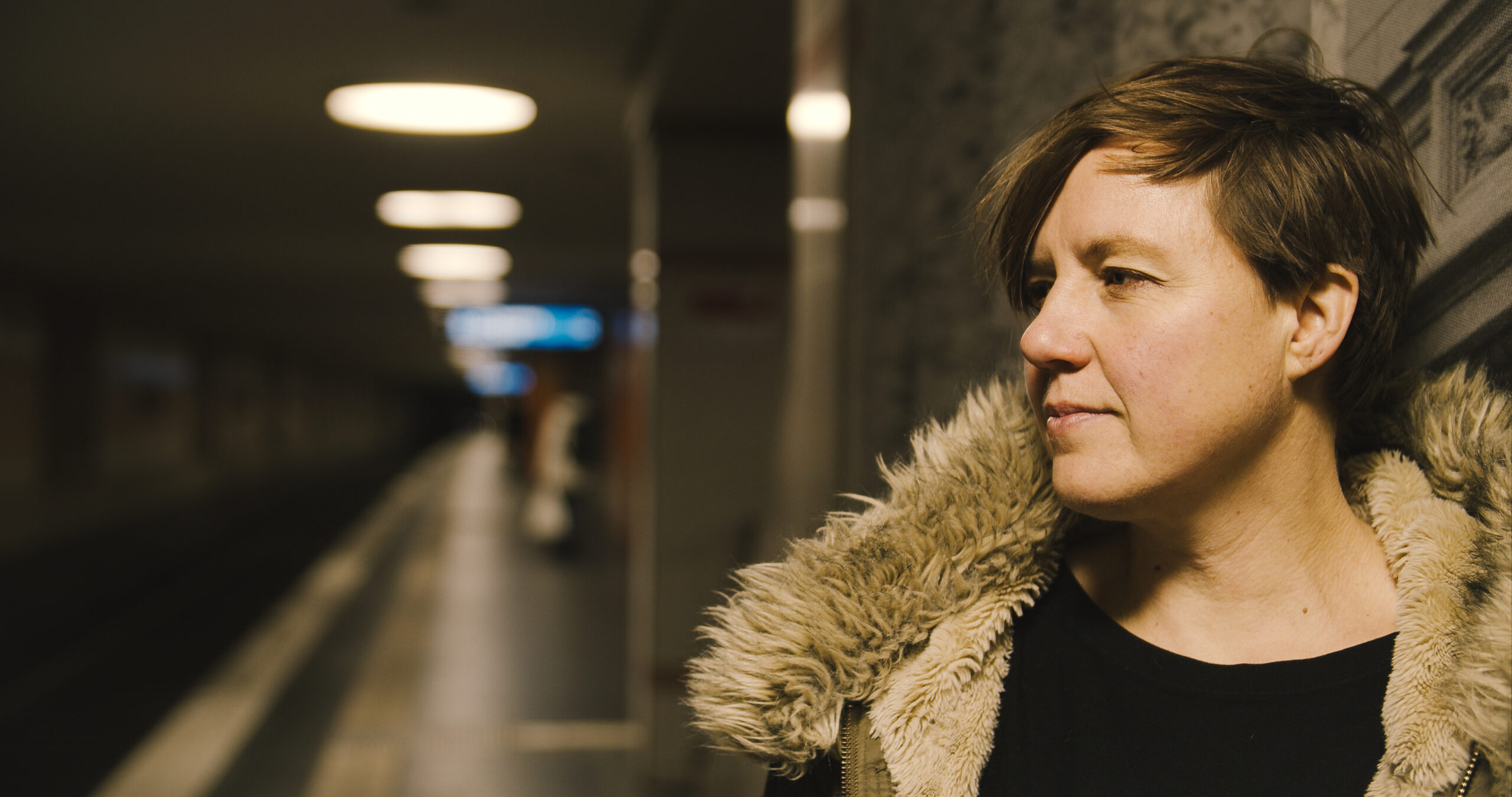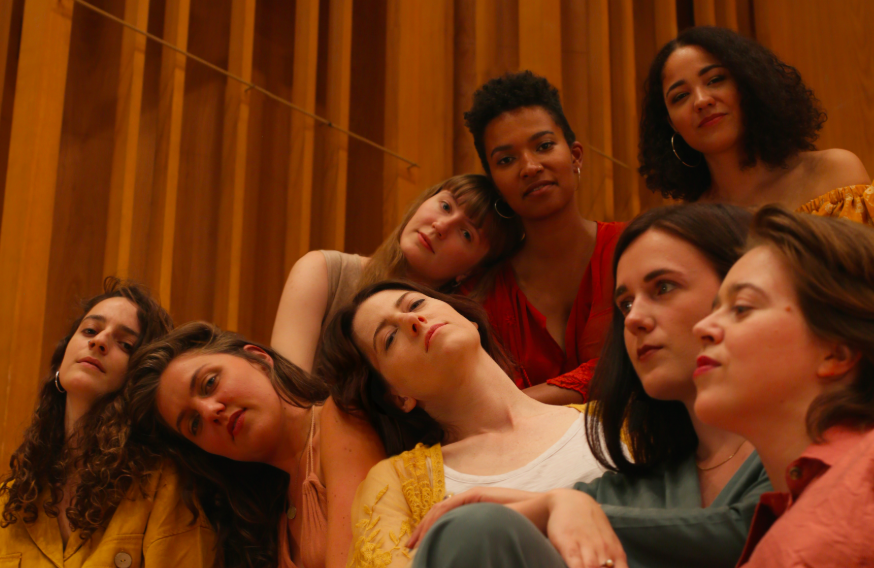Foto-Credit © Timothy Wiehn
Kat Frankie ist eine der spannendsten Künstlerinnen Deutschlands – dabei ist sie eigentlich Australierin. Immer wieder erfindet sie ihre Musik und sich in ihrer Rolle auf der Bühne neu. Dabei hat sie vor allem bei ihren Liveshows die große künstlerische Vision im Blick, die mehr umfasst als ihre ausdrucksstarken Songs. Nachdem sie mit ihrer LP Bad Behaviour erst einmal Abschied vom ruhigen Singer Songwriter Genre nahm, konzipierte sie nun mit B O D I E S zusammen mit sieben anderen Künstlerinnen eine beeindruckende A-Cappella-Show über die Bedeutung von Körperlichkeit, für die es bei den ersten Terminen begeisterte Standing Ovations gab. Vier der Songs erschienen im Dezember 2019 auf der gleichnamigen EP.
Wir haben Kat im Dezember kurz nach deren Veröffentlichung und kurz vor der Premiere der B O D I E S-Shows getroffen. Im Interview erzählt sie von der Weiterentwicklung ihrer körperlichen Ausdrucksformen auf der Bühne, die Herausforderungen der Arbeit abseits des klassischen Band-Schemas und dass sie bereits am nächsten Kat Frankie Album schreibt, das schon wieder ganz anders klingen wird.
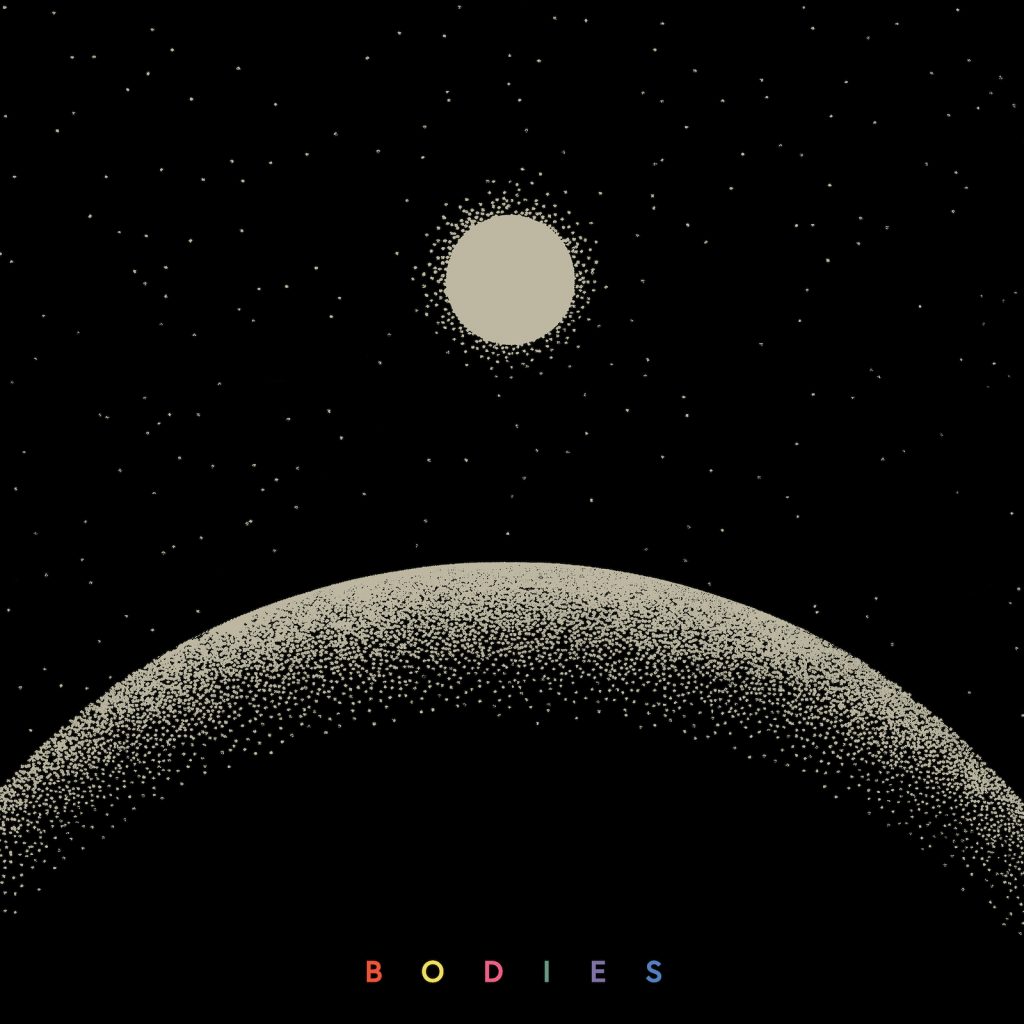
Thank you for taking the time to meet with us. You must be quite busy. Your EP BODIES just came out and you’re rehearsing the A-Capella show, how are you feeling?
It’s a stressful time, but it’s a good feeling to see how the production is developing and the show is getting better every day. It’s busy, it takes a lot of energy, but you’ve got to witness this beautiful progress. It’s a very productive time, I feel productive!
Your last couple of years have also been quite productive: You published your own new music, you very successfully collaborated with Clueso, you played guitar for Olli Schulz, you wrote the theme song for Schulz and Böhmermann with Get Well Soon. Are you a workaholic?
It just looks like that! I’m lucky that people ask me to do things. There was also the Marteria & Casper collaboration in 2018 and you ask yourself, why would rappers want Kat Frankie to sing on their chorus? But people ask me to do stuff and if I can do it, I go for it. I think it looks like I’m busier than I am, because I do lots of different things with other people.
So, you’re more of a team player than a workaholic?
Maybe? I don’t know what I am! It’s too hard to say.
You have lived here since 2004 and obviously are very well connected in the German music scene. Do you still sometimes feel strange?
When I came here, I wanted to be part of the German scene. It was important to me to work with German artists, work with German labels, get to sing in German… I really wanted to be a part of that, and I managed to become a part of that. On the other hand, I’m an artist that writes and sings in English, which is weird. I love that I get to make what I get to make. English is my Muttersprache and at the end of the day, if there are people, who are supportive of me, I don’t care, which country it’s in. And somehow, it has become this career and I’m lucky that I get to make, what I make. I don’t really think about it.
Was it rather a natural process than an actual pursuit?
It happened over time. In the beginning, I was really looking for these opportunities to get into the German music industry. Sometimes, the German music industry is also a bit frustrating, because you’re battling against a very established idea of popular music. It can be quite conservative at times. But I’m here in Germany, I got to be a part of it and that’s amazing.
With your album Bad Behaviour you made a big change and left the rather quiet singer songwriter genre of your previous records. Now with B O D I E S, you’re working with your songs on a completely different level performing them acapella. Do these changes in your writing and performing happen slowly or is there usually one situation or thought that provokes them?
I’m always planning in advance, thinking about the next thing. After I finished Please Don’t Give Me What I Want, I knew that I wanted to spend time doing other things. There was such a huge break between those two albums. So, I did a lot of collaborations and soundtracks and all sorts of things. Over time, I wanted to make something closer to pop music. Working with that kind of song structure and big choruses and a more joyful vibe – I haven’t done it before. I wanted to be able to dance on stage. I went on tour with Clueso and he’s running around the stage like a crazy person and I thought, how joyful, I want to do that, too. Then I thought, what do I want to do next? I experimented a little with acapella and I thought, that’s a bit different, that could be fun, and it could be a little bit theatrical. The whole idea was to try something in this direction. I’m already working on my next album and that’s going in another direction. I’m not interested in doing the same thing twice. I’m a very selfish artist. I like to try new things that interest me and make me happy.

But isn’t that the whole point of art, giving a part of yourself to others? You can’t do that if you bore yourself.
It’s true! I have fans that have opinions about my choices, and they tell me, but sometimes I have to remind them, I’m just a person who doesn’t want to do the same thing all the time. Everything I make, you can have and interact with, it’s also for you. But like you said, if I’m boring myself, nothing’s ever going to get done!
Let’s talk about your performances. Over time, they have become more physical: You used to play guitar on stage, then stopped playing guitar, now you stopped having instruments. Do you think, you became more theatrical and therefore more direct in your expression?
I’m less afraid. When you stand in front of an audience and you’re singing, you’re giving them something that you made. It can be scary. I had the guitar in front of me, you feel protected by that, it’s like a shield. And then you take it away and it’s just me and a microphone stand. And now we’re taking away the microphone stand. It’s about a body in a space with an audience, which is pretty much as close as you can get. I used to be scared about that, I used to feel awkward what to do with my body on stage. But seeing Olli jump around the audience in a unicorn boat, seeing Clueso and seeing Casper & Marteria – they spend the entire show jumping. It’s seeing how people use their bodies and how that provides an extra layer of performance. It’s a waste to be frozen behind your guitar. You have an extra element of movement to communicate your ideas.
But you go further than the artists you just mentioned, because you directly use the body as part of the art…
Yes, that’s the next step. I want to take it beyond that. For the B O D I E S tour, we even built a set that we walk on. For some of the songs, we just stand and sing. For other songs, there are some very specific movements that we put together. We’re also looking how to occupy the space physically. After these shows, I hope to take it further again and to see what that could become.
You must have very specific needs for the room and the sound, it must be quite challenging. How is it different from working with a band?
It’s a lot of work! When you’re with a vocalist, it’s questions like, do you sing it quiet, do you sing it loud, do you put more air in your vocal, is it chest voice, is it head voice? There are so many factors. You must think about the blend. It’s not just me having to be aware of everyone and everyone’s parts while I’m singing at the same time, all the singers must listen to each other and be aware of each other. This is not a bass player playing with a drummer, it’s very heightened. And we’re also doing percussion. We’re stomping and clapping, so you have to listen to who’s clapping what and who’s on time and how loud that is. It’s a lot more complicated that I thought it would be.
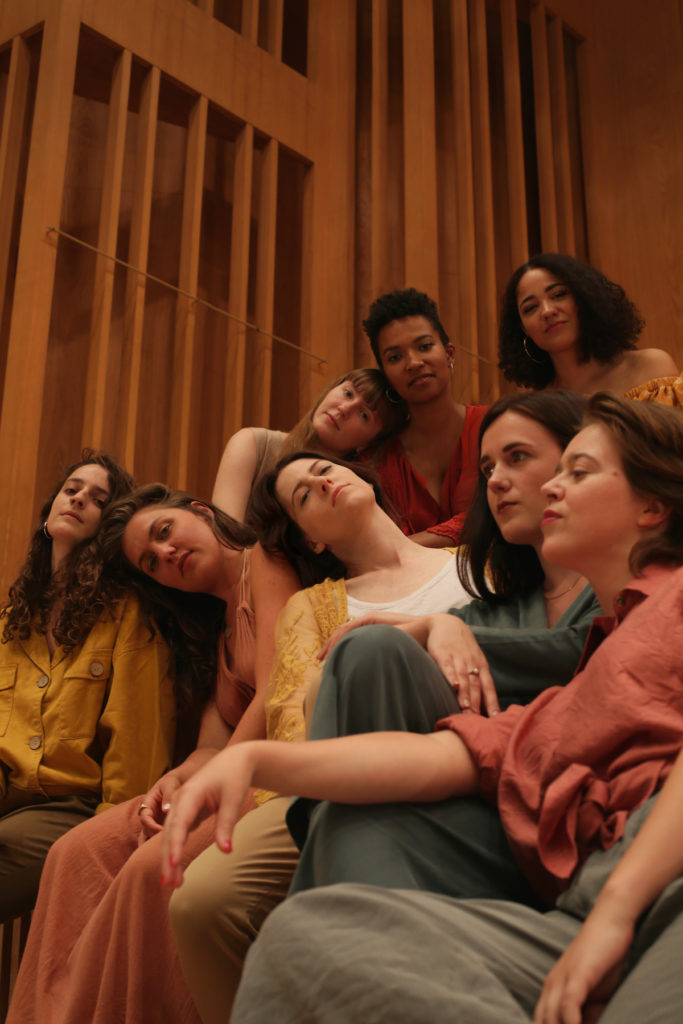
How did you find and choose the seven other singers?
Albertine Sarges has been singing in my band for a long time and I love working with her. I also love the music that she makes herself. And there’s Tara Nome Doyle, who has also played with me. It’s a lot of singers I have met over the years. The good thing is, it’s quite easy to find the right musicians these days. Young musicians all have Instagram accounts, where they post a lot of videos of themselves singing. So, there’s a few people I found through Instagram. I put it together very specifically. I wanted artists that were the front people of their own project, so they would have a real performing energy. All these women have their own bands, but they’re also songwriters. They don’t just sing perfectly, they’re creative minds. When we rehearse, we’ve got people throwing in ideas all the time. Everyone’s thinking about how to build the show, they’re not just there to work.
Your performances have always had a strong visual element, I remember one of the first shows I saw by you was the TV Noir recording in 2011 and your whole look with the black suit and the white shirt was very in tune with the black and white filming. At your Bad Behaviour Tour, you and the band all wore red. Besides the music, you seem to take very specific care of the visual aesthetics of your shows.
Yes, we talk about clothes a lot. Again, like movement, clothes are another form of self-expression. I also feel like you need to dress for the audience in a way that says, I’m glad that you’re here. It’s an opportunity to create something interesting visually. In Germany, when you go and see a band and it’s five guys wearing brown leather jackets and didn’t wash their hair that day, people go, “Oh, it’s so authentic!” Everyone seems to get tricked by that. As if it hasn’t been a choice that those people have made. It’s so easy to forget that you don’t just listen to a concert, you watch a concert. To pretend that people don’t have eyes is just silly to me. It’s a chance to express yourself, why not use it?
With the B O D I E S EP you came back to songs from the Bad Behaviour record besides one new song you wrote. How does it feel to revisit your work from a completely different angle?
It’s weird. There are four or five new songs on the show that aren’t on the EP and I have to say, it’s much easier writing new songs than trying to create new arrangements of old songs. It’s a lot of work to take something that was written for instruments and try to make it work as an acapella version. Although, some things, I’m very excited about. Performing Versailles as a choir piece for example, I think, it works quite well. I’ve been doing different versions of my songs for years, though. Please Don’t Give Me What I Want was an acapella song, then it became a loop station thing, I even have a slow-motion band version of that song… I have different versions of lots of my songs, but it’s hard to translate a band arrangement to a people arrangement.
I think, one aspect why Versailles works especially well, is the meaning of the song. Women raising their voices. Another very political song from Bad Behaviour is Home. Are those topics part of your daily life and thoughts and are therefore reflected in your music or is there a motivation to use your public voice for political reasons?
It’s both. You write about things that effect you. Normally, when I write songs, I’m writing about my daily life and things that interest me. When I was writing that album, that’s when politics started to get hysterical and crazy and everyone was losing their minds. There was a lot of discussion about what responsibility artists have. As far as creative minds speaking truth to power, it’s often the comedians of the society who challenge politics and politicians, combining perspectives with entertainment. Me being a singer songwriter with an acoustic guitar – do I have a responsibility to contribute to that? Do I want to contribute to that? Do I want to talk about what I think and what my opinions are? Would people even be interested in that? Especially with Home, it came out of me wanting to express how I felt. If you have a platform to communicate what you think, you should use it. There’s a lot of artists who keep quiet, because they don’t want to alienate their fans. I think it’s bullshit. For me, it was like, “Well, that’s what we’re going to do.” And there’s political things in the B O D I E S show as well, some parts are a little anti-capitalist.
You have been very vocal about being a woman in the music industry from the very beginning. Now, more and more women raise their voices, but it’s been a long time that not many people publicly spoke about the difficulties for women in the business. Do you have the feeling, there’s finally light on the horizon?
I don’t think there is, yet. I think what’s wonderful now is that women in the music industry are finding each other. We used to be very separated and isolated from each other. In the last year, I’ve never met so many women before also doing music. I always felt a little bit on my own. Even a few years earlier, going on tour with Olli playing guitar at Highfield festival and being one of three women in the backstage and there would be 100 guys there to play. We’re finding each other now, and that means, we can support and uplift each other. The main thing is that the industry is not going to develop until certain people are pushed out of power. And that’s also what stopped women from being loud and proud in the first place. If you make too much trouble, people don’t necessarily want to work with you. Also, it’s just fucking exhausting. To have to be the one who questions the sexist jokes backstage. It’s such a drag! It’s a great time for women to build a community, but I don’t think the industry has actually changed at all. That’s going to take a lot longer.
Kat Frankie performs B O D I E S:
27.04.2020 Volksbühne, Berlin
28.04.2020 Volksbühne, Berlin
29.-30.08.2020 Golden Leaves Festival, Darmstadt


